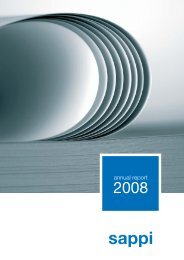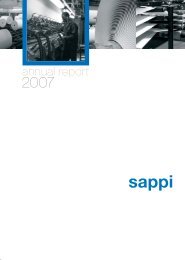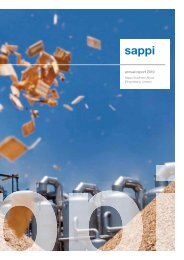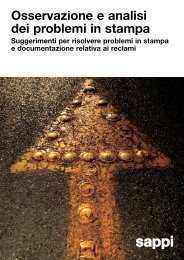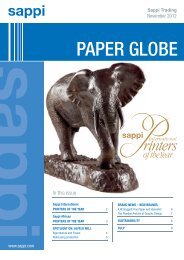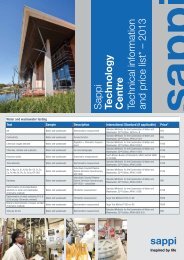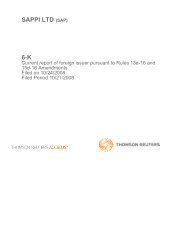2012 Integrated report - Sappi
2012 Integrated report - Sappi
2012 Integrated report - Sappi
Create successful ePaper yourself
Turn your PDF publications into a flip-book with our unique Google optimized e-Paper software.
Notice to shareholders<br />
Annexure to notice of annual general meeting:<br />
Explanatory note to special resolution number<br />
3 and salient features of the Memorandum of<br />
Incorporation of the company<br />
As explained below, the company wishes to adopt a new<br />
Memorandum of Incorporation (‘MOI’).<br />
The Companies Act came into effect on 01 May 2011. In terms<br />
of the Transitional Arrangements set out in Schedule 5 to the<br />
Companies Act, companies were given a two-year period until<br />
30 April 2013 to bring their Memorandum and Articles of Association<br />
in harmony with the Companies Act. During this two-year period,<br />
if there is a conflict between a provision of the Companies Act and<br />
a provision of a pre-existing company’s Memorandum and Articles<br />
of Association, the provision of the company’s Memorandum and<br />
Articles of Association prevails. After this two-year period, any<br />
provision of the Memorandum and Articles of Association that is<br />
inconsistent with the provisions of the Companies Act, shall be void<br />
and unenforceable to the extent of the inconsistency. Accordingly,<br />
the company wishes to adopt a new MOI which is consistent with<br />
the Companies Act.<br />
The approach that was followed in drafting the MOI was to keep the<br />
MOI simple and let the provisions of the Companies Act govern the<br />
company’s affairs, save for those specific instances where there was<br />
a need to alter an alterable provision of the Companies Act, or where<br />
an alteration was required by the JSE Listings Requirements. The<br />
company believes that it is unnecessary and undesirable to repeat, in<br />
the MOI, the provisions of the Companies Act that would apply to a<br />
company unless the provision is intended to alter an alterable<br />
provision or impose a higher standard than an alterable provision.<br />
The MOI provides that the company is a public company.<br />
Accordingly, the company is not prohibited from offering its securities<br />
to the public and the transfer of the company’s securities is<br />
unrestricted save as set out in the MOI.<br />
The first part of the MOI (paragraph 3) deals with general matters.<br />
In regard to amendments to the MOI, the MOI states that the<br />
requirements set out in the Companies Act regarding proposals<br />
for amendments to the MOI apply without amendment and any<br />
amendment of the MOI, including an amendment for the change<br />
of name of the company, must be approved by special resolution of<br />
the shareholders of the company who are entitled to exercise voting<br />
rights on the resolution unless such amendment is ordered by a<br />
court in terms of section 16(1)(a) and 16(4) of the Companies Act.<br />
The MOI provides that the powers of the company are not restricted<br />
and that the board shall not have the power to make, amend or<br />
repeal any necessary or incidental rules relating to the governance<br />
of the company, as required by the JSE Listings Requirements.<br />
The MOI also provides for the authority of the board to authorise<br />
the company to provide direct or indirect financial assistance to any<br />
person contemplated in section 45 of the Companies Act and that<br />
the solvency and liquidity test set out in section 4 of the Companies<br />
Act apply without amendment.<br />
Paragraph 4 of the MOI deals with the securities of the company<br />
and provides that all securities of each class rank pari passu in all<br />
respects. The MOI deals with the authorisation of shares as follows:<br />
The MOI provides that the company is authorised to issue the shares<br />
specified in Schedule 1 to the MOI, provided that, if required by the<br />
Companies Act or the JSE Listings Requirements, the company may<br />
only issue:<br />
• unissued shares to shareholders of a particular class of shares,<br />
pro rata to the shareholders existing shareholding, unless any<br />
such shares were issued for an acquisition of assets;<br />
• unissued shares or grant options, to subscribe for cash,<br />
as the directors in their discretion think fit, if approved by<br />
the shareholders at a shareholders meeting, subject to the<br />
JSE Listings Requirements; and<br />
• shares that are fully paid up.<br />
For so long as is required by the JSE Listings Requirements, any<br />
amendment to the MOI to:<br />
• increase or decrease the number of authorised shares of any class<br />
of shares;<br />
• reclassify any shares that have been authorised but not issued;<br />
• classify any unclassified shares that have been authorised but<br />
not issued;<br />
• determine the preferences, rights, limitations or other terms<br />
of any class of authorised shares or amend any preferences,<br />
rights, limitations or other terms so determined;<br />
• create any class of shares;<br />
• convert one class of shares into one or more other classes;<br />
• consolidate or sub-divide securities, and<br />
must be approved by special resolution of ordinary shareholders,<br />
save where such an amendment is ordered by a court in terms<br />
of sections 16(1)(a) and 16(4) of the Companies Act.<br />
In regard to capitalisation shares, the MOI does not limit, restrict<br />
or qualify the authority of the board, in terms of section 47 of the<br />
Companies Act, to:<br />
• approve the issue of any authorised shares of the company as<br />
capitalisation shares, on a pro rata basis to the shareholders of<br />
one or more classes of shares;<br />
• approve the issue of shares of one class as capitalisation shares<br />
in respect of shares of another class; or<br />
• permit shareholders to elect to receive a cash payment in lieu of<br />
a capitalisation share or a scrip dividend (as defined in the JSE<br />
Listings Requirements), at a value determined by the board.<br />
In regard to financial assistance for the subscription or purchase<br />
of shares, share buy-backs and debt instruments, the MOI does<br />
not limit, restrict or qualify the authority of the board to take those<br />
actions, subject to compliance with the requirements of the<br />
Companies Act and the JSE Listings Requirements. For so long as<br />
required by the JSE Listings Requirements, no repayment of capital<br />
to shareholders shall be made on the basis that it may be called up<br />
again and dividends must be payable to shareholders registered as<br />
at the date subsequent to the date of declaration of the dividend.<br />
The MOI provides for the registration of the company’s issued<br />
securities in the name of one person for the beneficial interest<br />
of another without limitation or restriction.<br />
The MOI provides that the company may pay commission to any<br />
person in consideration of such person subscribing, or agreeing<br />
to subscribe, for any shares of the company or of such person<br />
procuring, or agreeing to procure, subscriptions for shares, provided<br />
that such commission shall be subject to any limitations in the<br />
Companies Act or the JSE Listings Requirements.<br />
The MOI provides that all authorities to sign transfer deeds granted<br />
by holders of shares for the purpose of transferring shares that may<br />
be lodged, produced or exhibited with or to the company at any<br />
of its transfer offices shall, as between the company and the grantor<br />
192



